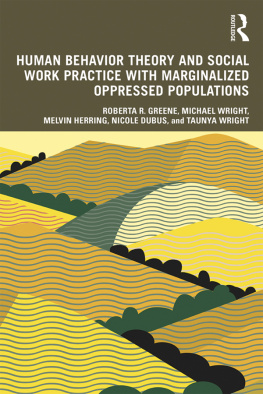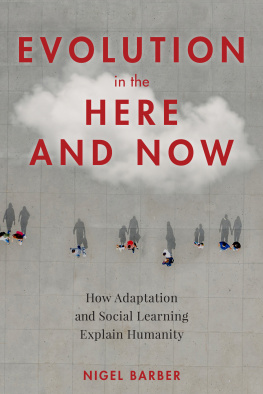First published 2011 by Transaction Publishers
Published 2017 by Routledge
2 Park Square, Milton Park, Abingdon, Oxon OX14 4RN
711 Third Avenue, New York, NY 10017, USA
Routledge is an imprint of the Taylor & Francis Group, an informa business
New Material this edition copyright 2011 by Irl Carter
All rights reserved. No part of this book may be reprinted or reproduced or utilised in any form or by any electronic, mechanical, or other means, now known or hereafter invented, including photocopying and recording, or in any information storage or retrieval system, without permission in writing from the publishers.
Notice:
Product or corporate names may be trademarks or registered trademarks, and are used only for identification and explanation without intent to infringe.
Library of Congress Catalog Number: 2010040840
Library of Congress Cataloging-in-Publication Data
Anderson, Ralph E.
Human behavior in the social environment : a social systems approach / Ralph E. Anderson and Irl Carter.
p. cm.
Sixth Edition.
Rev. ed. of: Human behavior in the social environment : a social systems approach / Ralph E. Anderson and Irl Carter with Gary R. Lowe. 5th ed. 1999.
Includes bibliographical references and index.
ISBN 978-0-202-36398-1
1. Social systems. 2. Social institutions. 3. Human behavior. I. Carter, Irl. E. II. Title
HM586.A54 2011
301dc22
2010040840
ISBN 13: 978-0-202-36400-1 (pbk)
ISBN 13: 978-0-202-36398-1 (hbk)
Dedicated to the memory of
Ralph Anderson (1928-1997)
and
Diane Anderson (1931-2008)
Nobody would choose to live without friends even if he had all the other good things.
Aristotle
I am deeply indebted to the people mentioned here for their support and advice during the preparation of this edition of Human Behavior in the Social Environment.
To Dr. Irving Horowitz and Mary Curtis, for their support and guidance, and to the Transaction staff. It is an honor to be associated with a publishing house with such a distinguished record in the social sciences, and a commitment to scholarship, integrity, and truth.
To Dr. Bruce Curtis, Emeritus Professor, Michigan State University, and Joy Hilleary Curtis R. N., M. A., Emeritus Professor and Ombudsman Emeritus, Michigan State University, for their willingness to review the book and to contribute to sections of it.
To the staff of the Washington County, Minnesota, Public Library, and Marlyce Lee, former Branch Manager, for years of assistance. It is an invaluable resource, amazing, well-provisioned and helpful.
To the four Ks of the Anderson family: Kim, Kyle, Kristi, and Kerry, for carrying on their parents tradition of generosity and friendship.
To William R. McCarthy, poet and anam chara, and his wife Kathryn, great friends, for hours and days of companionship and inspiration at various coffee shops, New Years and St. Patricks day parties, and in Spain, Peru, England, Ireland, and who knows where, next?
To my family, for being there, and being who they are; and to Abby, Jacob and Sam, who are becoming the amazing people they will be.
And to Sharon Carter, who supported me (literally and figuratively) in recovering from a leg fracture during the months before this edition was completed. She bore with my spells of productivity and frustration, as she has for nearly forty years, and is as responsible for this edition as I am.
Irl Carter
We will need, as Balzac said, profound people, and not merely those who calculate; radical minds and not merely technicians. Thus, we will need people trained through doubt and questioning. The havoc caused by routine thinking and political improvisation is clear enough today.
Maurice Merleau-Ponty, quoted in Georgiou (2007)
This edition marks the thirty-seventh year since the first edition of this book appeared. Then, systems theory was a relatively obscure set of suppositions and observations, and social systems had little recognition or status; in fact, it was largely regarded as one more attempt to scientize ideas about human behavior. Now, social systems is a theory accepted widely in the social sciences and human service professions. Systems theory is an acknowledged source of some of the most exciting ideas in science, including the social sciences and the field of human behavior. One theorist celebrates the systems movement (Georgiou, 2007:35). That may be an overstatement, but clearly systems ideas have been fruitful (to continue the tree metaphor) and have become the lingua franca, the common metaphor or model, across most academic, scientific, and technical disciplines. Clearly the computer, in its infinite applications, plays a major role in this.
This sixth edition is organic; its branches have spread and its roots are deeper than in previous editions, but it is still the same tree. Those of our readers who are familiar with preceding editions may notice that we have dropped or revised some items, while adding others: in particular, the section on phenomenology and its relationship to professional practice in the human services.
Our emphasis in this edition is less to carry the banner of systems theory, than to encourage systems thinking, meaning both to think sys-temically and to make explicit its implications for practice and praxis.
The theme of caring, in the previous edition, has expanded and deepened in this edition; here, we develop empathy as the key concept, as elaborated in the Addendum to , a new section on application of systems thinking to professional practice. Empathy emerges as a central concept in the line of reasoning from Systems Theory to Phenomenology to Neuroscience to professional practice and praxis as we lay it out in that Addendum. It underlies all the human services, as the foundation on which personal commitment and professional practice are based.
To my mind there must be, at the bottom of it all, not an equation, but an utterly simple idea. And to me that idea, when we finally discover it, will be so compelling, so inevitable, that we will say to one another, Oh, how beautiful. How could it have been otherwise?
John Archibald Wheeler, quoted in Wheatley (2006)
Marvin Minsky has said that you need to understand something at least two different ways in order to really understand it. Each way of thinking about something strengthens and deepens each of the other ways of thinking about it. Understanding something in several different ways produces an overall understanding that is richer and of a different nature than any one way of understanding.
Mitchell Resnick, quoted in Johnson (2001)
This book maps the territory of human behavior. It is intended to introduce students in the human services to ideas and theories that are fundamental to understanding human behavior. Students in social work, nursing, education, child development, and other disciplines that provide human services require an acquaintance with a vast body of knowledge about the behavior of humans. Today it is impossible to present enough information in one book to accomplish this.











